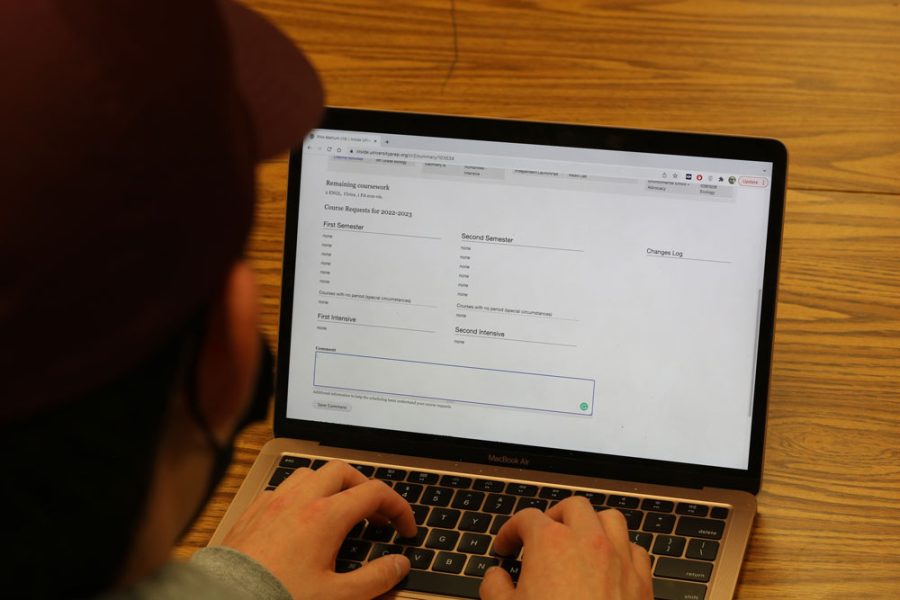Three Major Curriculum Changes
Departments pushes for new classes in math, history, and English
Photo: Phin Mahlum
A student looks over an empty course request form for 2022-2023.
University Prep is implementing changes to the math, history, and English curricula next year.
According to Assistant Head of School for Academics and Strategic Initiatives Richard Kassissieh, having three major subjects changing their curricula in a year is rare, but understandable.
“In our last strategic plan we went all-in on choice, and we provided lots of different options and ways to structure a course program,” Kassissieh said. “Now we’re trying to find more of a balance between choice and coherence, reigning in the courses that have diverged, solving the rising questions around whether students are getting the same core knowledge.”
Math
The math department proposed to change the current rotation of Geometry A and B and Algebra IIA and IIB. Students will now take a full year of Geometry, then a full year of Algebra II.
Math department head David Peabody hopes this simplicity will help current and transfer students make their way through UPrep.
“This change will allow students from different schools to seamlessly transition into our sequence,” Peabody said. “It is also much easier for us to have a full year to focus on both Algebra II and Geometry because you have the same teacher for the whole year, and teachers are not forced to fit all their material into a semester.”
It could even impact students’ preparedness for college admissions.
“We have found that because students often struggle with Algebra on standardized testing, teaching it closer to these tests can help better prepare students, hopefully raising their SAT and ACT scores,” Peabody said.
History
The history department will change the current system for 11th graders. Instead of a choice between two semester-long courses on specific topics — like current events or race and immigration — or a year-long survey class, all students will take a full year of U.S. History.
Department head Andrew Schneider hopes that this change will create a more well-rounded learning experience for students and give them time to create a stronger connection with their teacher.
“Students choosing the topics mix and match style did not have a sufficient background in U.S. history to take on these important themes in semester style classes,” Schneider said. “However, having a year-long 11th-grade history course allows us to take the best elements of the current survey option and the topics option.”
The history department will continue to offer students choices.
“A forward-looking idea is that the year after next, we will bring back some choice to students with civics. Offering seniors different civics options like civics social justice, civics the legislative process, civics environmental ethics, and so on,” Schneider said.

English
The third curriculum change comes from the English department. This change moves 11th graders to a year-long English class, similar to the current ninth-grade Foundations in Composition course.
“This change will strengthen our English program by giving students solid foundations, allowing them to dive deep into something they wish to focus more on in their senior year,” head of the English department Carrie Niebanck said.
Niebanck hopes this will help teachers connect with their students better.
“With English being such a recursive subject, as teachers, we don’t get to know our students for a full year,” Niebanck said. “With this change, it will allow us to see students’ growth, particularly in writing, and to support them consistently.”
Niebanck and the College Counseling Office hope this change will help students cultivate more fundamental writing skills, better preparing them for the college process.
Since English elective choices will only be available for 12th graders, the breadth of choices will be limited to six and determined by a survey taken by rising seniors. This change will have a spillover effect on every future senior class.
Although varying in magnitude, each department believes the changes will increase students’ growth and relationships with teachers, creating a well-rounded educational progression and preparing them for college and standardized testing.
Your donation will support the student journalists of UPrep.


